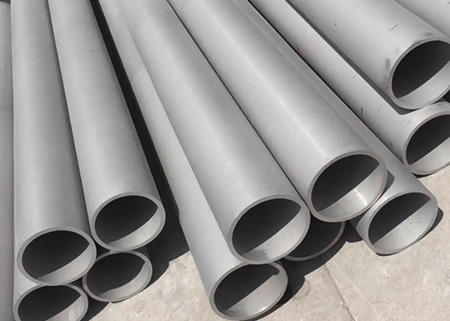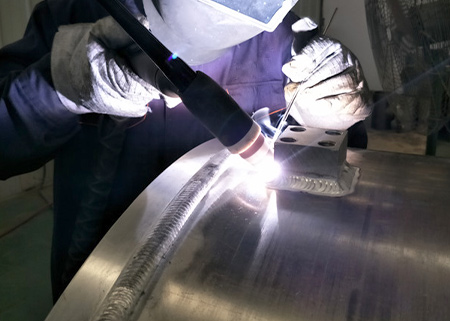Introduction
In the chemical industry, the importance of pipeline selection and materials cannot be underestimated, and stainless steel pipes have gained significant attention. This article delves into the numerous advantages of stainless steel pipes in the chemical industry, including their outstanding corrosion resistance, high-temperature performance, robust mechanical properties, reliability, durability, ease of maintenance, and environmental friendliness. By analyzing these aspects in detail, we will gain a better understanding of the value and importance of stainless steel pipes in the chemical industry.
Corrosion Resistance of Stainless Steel Pipes

The excellence of stainless steel pipes lies in their exceptional corrosion resistance. This property is attributed to the presence of chromium in stainless steel, which reacts with oxygen to form a dense oxide film, commonly known as a passivation film, covering the surface of the stainless steel pipes. This oxide film effectively resists the corrosion and oxidation caused by oxygen and moisture, thereby protecting the pipes from harm.
In the chemical industry, pipelines often need to handle corrosive gases, acidic substances, and other aggressive media. The corrosion resistance of stainless steel pipes provides robust assurance for system reliability. They are less susceptible to corrosion and blockages, contributing to the smooth flow of pipelines and improved system efficiency.High-Temperature
Performance of Stainless Steel Pipes
Stainless steel pipes exhibit excellent tolerance to high temperatures, forming a solid foundation for their widespread use in the chemical field. The high-temperature tolerance of stainless steel pipes is derived from their material characteristics and manufacturing processes. These pipes are typically made of high-quality stainless steel, possessing excellent thermal stability.
Under high-temperature working conditions, stainless steel pipes can maintain their mechanical performance and corrosion resistance without deformation or rupture. In the chemical industry, handling high-temperature emissions is a common challenge. Many processes involve dealing with high-temperature gases or liquids, making high-temperature resistance crucial. Stainless steel pipes impressively maintain stability under high-temperature conditions, without suffering damage from temperature increases.
Mechanical Performance of Stainless Steel Pipes
In addition to excelling in corrosion resistance and high-temperature performance, stainless steel pipes also have a significant advantage in terms of mechanical performance. This feature makes them an ideal choice in the chemical industry.
The mechanical performance of stainless steel pipes includes aspects such as strength, toughness, and wear resistance. They typically have excellent tensile and compressive strength, making them capable of withstanding high-pressure liquids or gases. This suitability for high-pressure applications makes them suitable for systems requiring such performance.
Furthermore, stainless steel pipes exhibit high toughness, making them less prone to fractures when subjected to external impacts or vibrations. This is particularly important for pipeline systems in the chemical industry, as they may be subject to various mechanical stresses.
Finally, their wear resistance is noteworthy. In some processes, the media flowing through the pipes may contain solid particles, which could lead to wear on the inner walls of the pipes. Stainless steel pipes’ wear resistance allows them to be used in such environments for extended periods without excessive wear.
Reliability and Durability of Stainless Steel Pipes
Apart from the mentioned advantages, stainless steel pipes are also renowned for their reliability and durability. In the chemical industry, the reliability of pipeline systems is crucial because any failure could lead to production interruptions and safety risks.
Stainless steel pipes can provide outstanding reliability because they are less susceptible to corrosion, high temperatures, mechanical stress, and wear. This ensures their long-term stable operation in chemical processes, reducing the need for maintenance and replacements. This is particularly essential for factories that require continuous production, as they need to ensure that their pipeline systems do not fail, maintaining production continuity.
Moreover, the durability of stainless steel pipes is part of their attractiveness. They typically have a longer service life, do not age or fatigue easily, and can be used for extended periods without failure. This reduces the total cost of ownership of pipeline systems and provides factories with reliable pipeline solutions.
Ease of Maintenance of Stainless Steel Pipes
Lastly, stainless steel pipes are known for their ease of maintenance. In the chemical industry, maintenance of pipeline systems is crucial to ensuring the smooth operation of systems. The design and material selection of stainless steel pipes make them easy to maintain.
Firstly, the smooth surface of stainless steel pipes does not readily accumulate dirt and deposits, making cleaning and maintenance work more accessible. Additionally, the material characteristics of stainless steel pipes make them resistant to the impact of cleaning agents and chemicals, allowing for various cleaning methods.
Furthermore, the connections of stainless steel pipelines are typically welded or threaded, which provides stability and sealing. This reduces the risk of pipeline leaks, decreasing the frequency of maintenance work.

Environmental Friendliness of Stainless Steel Pipes
Lastly, it is important to emphasize the environmental friendliness of stainless steel pipes. In today’s society, environmental awareness is increasing, and businesses are increasingly focused on reducing their impact on the environment. Stainless steel pipes have their advantages in this regard as well.
Firstly, stainless steel is a recyclable material, meaning that discarded stainless steel pipes can be recycled and reused, reducing resource waste. Additionally, the production process of stainless steel is relatively clean, reducing environmental pollution.
Moreover, the durability of stainless steel pipes means that they do not need frequent replacement, reducing waste generation. This helps lower the demand for new materials in the chemical industry, reducing resource consumption.
In summary, stainless steel pipes offer sustainability in terms of environmental impact, helping to reduce negative effects on the environment. This is why an increasing number of chemical enterprises are choosing stainless steel pipes as the material for their pipeline systems.
